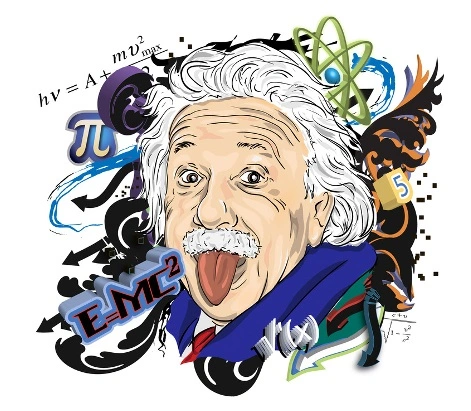EINSTEIN, ALBERT
Publié le 22/02/2012

Extrait du document

EINSTEIN, ALBERT (1879–1955), physicist; postulated the theory of the
relativity of mass. Born in Ulm, he spent much of his early life in Munich.
Averse to classroom regimentation, he withdrew from school at fifteen, relinquished
his citizenship, and joined his parents in Milan. He soon relocated to
Switzerland, where, upon completing Gymnasium in 1901, he took Swiss citizenship.
In rapid succession he wrote his first scientific works while working as
an official at the Swiss Patent Office in Bern, completed a degree in physics
and mathematics at Zu¨rich's Technische Hochschule, qualified as a Privatdozent,
started a family, earned a doctorate in 1905, and became an ausserordentlicher
Professor in 1909 at the University of Zu¨rich. In 1913 he relocated to Berlin*
as director of the Kaiser Wilhelm Institute for Theoretical Physics; he also became
a member of the Prussian Academy of Sciences. Eight years later he was the Nobel laureate for his 1905 work on the photoelectric effect. Upon accepting
his award in 1922, Einstein spoke not about his discovery of light quanta but
about his theory of relativity—confirmed in 1919 through observation of light
deviation in a solar eclipse.
After receipt of the Nobel Prize, Einstein was made an honorary German
citizen (he retained his Swiss nationality). However, in the years that followed,
many Germans denounced him; indeed, a society of Einstein opponents was
established in Berlin. They rejected his theory of relativity because he was both
a pacifist and a Jew.* Among those rebuking him was a fellow Nobel laureate.
Amidst the wave of murders that claimed the lives of Matthias Erzberger* and
Walther Rathenau,* friends advised him to leave Berlin. In 1922 he wrote Max
Planck* that people had warned him not to appear publicly because ‘‘I am said
to belong to the group of those people against whom the Nationals have planned
assassination* attempts.'' But Einstein ignored the warnings, and in time life
seemed to normalize. In 1929 the Berlin city council announced its intent to
honor him on his fiftieth birthday with a gift of property on one of Berlin's
lakes; however, the plan soon foundered on the negative vote of the Council's
DNVP members. Einstein purchased the site at his own expense.
In 1933, when Einstein and his wife were in the United States, news came
that Hitler* had seized power. Einstein resolved not to return home; he resigned
his positions and accepted appointment at Princeton's Institute for Advanced
Study. He never again saw Germany.
Liens utiles
- COMMENT JE VOIS LE MONDE, Albert Einstein (résumé)
- Le problème du rapport théorie-expérience - Albert Einstein
- Albert Einstein par Louis de Broglie de l'Académie française et de l'Académie des Sciences.
- Allemand d'origine, Albert Einstein changea deux fois de nationalité.
- Albert Einstein - ciencia y tecnologia.
